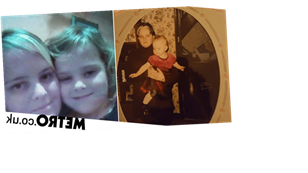Nicci Jayne Holcroft, 39, lived with postnatal depression for years.
‘I don’t recall the actual moment I knew I had it but I knew I felt low,’ she tells Metro.co.uk.
‘I felt like I was losing control, like I couldn’t be bothered with anything – especially my baby daughter, Emily.
‘I don’t remember thinking I wanted to kill myself, but I do remember thinking it wouldn’t be the end of the world if I wasn’t here.’
Nicci, a carer from Chester, says she was scared of how her mind was behaving. She knew something wasn’t right, but she was young – 20 at the time – and thought her emotions were normal after having a child so did not seek help.
Nicci had very little support at the time. Nicci’s romantic relationship with her partner broke down when Emily was six months old, making her a single mother – although Emily’s dad saw her at the weekends.
Nicci’s grandmother would have Emily for a few hours a week, but many times Nicci had to call in sick because she couldn’t afford childcare.
‘It felt like I had no support at all,’ Nicci explained.
‘It felt very lonely. It got worse then. I would lie in bed all day with Emily, with her just laying next to me in the dark.
‘I’d feed and change her but there wasn’t any proper interaction. She was a planned pregnancy that I had desperately wanted, which made me feel worse.’
Nicci says the worst she has ever felt led to her wanting to ‘smother’ her baby.
She said: ‘One day she wouldn’t stop crying, so I put her in her cot and went downstairs, but I could still hear her, so I shut the door and went in the kitchen.
‘I could still hear her, so I went to the ceiling cupboard, where I could still hear her.
‘I broke down and thought to myself I wonder if she would stop if I went up and put my hand over her mouth. I sat for a while and then left the cupboard to go upstairs.
‘She stopped crying when I got to the top. In all honesty I cannot guarantee I wouldn’t have done it if she had still been crying when I got to her.’
Nicci says it was this experience that made her want to seek help.
She went to her doctor who gave her antidepressants, but she didn’t take them because she didn’t want to admit to herself that she needed medication. She was living in denial.
Her doctor told Nicci her feelings were normal, which didn’t make Nicci feel better. Luckily, she had a supportive manager at work who would call her and ask her if she was okay, and they talked it out. However, she felt she wasn’t supported by her doctor, and her emotions were a rollercoaster of feeling that things ‘wouldn’t be so bad’ to going completely downhill again.
She said: ‘My doctor was a man and I know it shouldn’t matter but I’m not sure he got it.
‘I wasn’t referred to anything and I was just told to take tablets.’
When Emily turned three, things started to get better. Nicci doesn’t know why exactly this is – perhaps it’s that Emily became easier to deal with or it was due to hormonal changes – but she has no memory of her daughter’s first steps, crawling, or rolling over, or anything like that, which is something she still battles with to this day.
Emily, now 19, also became a ‘daddy’s girl’ when she was younger, and she and Nicci weren’t close until she hit 15 and was struggling with her own mental health – which Nicci blamed herself for.
Nicci received a phone call from Emily’s school to say she had been self-harming. The mum convinced herself that it was her fault, and that she should have been a better mother – but actually, the incident brought the pair closer together, as they were able to open up to one another and talk about what they had both been going through.
Since then, they have been super close.
‘I couldn’t be happier with our relationship now,’ said Nicci. ‘She knows everything and understands it wasn’t me, it was my brain.’
Emily had another child when Emily was five – a son, who is now 14.
Nicci says her experience as a new mother with her son was totally different.
She went to the doctor immediately and explained what had happened with Emily. This time they monitored her wellbeing and offered her support.
She said: ‘My son wasn’t planned. After Emily I didn’t want any more children and I did wonder if I could go through with the pregnancy.
‘But my relationship with him is so different, I remember everything and probably still baby him now.’
She added: ‘I’m okay now, I think I always have low days as I’ve been through a lot, and I need to deal with that.
‘But postnatal depression is the one thing that robbed me of my daughter’s first steps and my feelings of wanting to be a mum, and I’ll never get that time back.’
When asked whether Nicci had any advice for other mothers suffering with postnatal depression, she said: ‘For anyone suffering I suppose I would say try not to carry the guilt afterwards.
‘I wanted to smother my daughter to shut her up but I realise that wasn’t me, it was a disease or whatever you want to call it – my brain that took over.’
Source: Read Full Article

